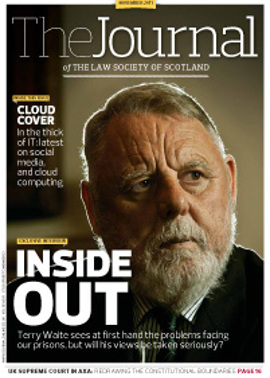Law reform update
October saw a busy month for the Law Reform team, with two particular highlights.
Scotland Bill
Michael Clancy, Alan McCreadie and Christine O’Neill, convener of the Society’s Constitutional Law Subcommittee, gave oral evidence to the Scotland Bill Committee. The whole session focused on clause 17, and the Society stated its case for deleting the clause from the bill.
Under clause 17, acts of the Lord Advocate in prosecuting an offence will no longer be subject to challenge under devolution minute procedure as under the Scotland Act 1998. The accused will only be able to raise a “compatibility issue”. If the court determines in favour of the accused it will acknowledge that the Lord Advocate has acted incompatibly with ECHR, but that will not itself nullify the Lord Advocate’s action.
It is unclear as to when during the course of proceedings an appeal can be taken, or what will be the effect of a finding of incompatibility.
The Society also raised how such an action is to be intimated to the Advocate General so that he can decide whether to take part in proceedings.
The Society further takes issue with Lord McCluskey’s review group recommendation that any appeal to the Supreme Court can only proceed on a question of compatibility if the High Court grants a certificate of “general public importance”. The Society believes that an individual’s human rights should not be assessed against a public importance test.
Clause 17 is also unclear as to whether a finding of incompatibility amounts automatically to a miscarriage of justice or whether that test must be separately satisfied.
One unintended consequence is that acts of the Lord Advocate will have greater protection than Acts of the Scottish Parliament, or other Scottish Ministers whose acts can be declared beyond their powers and accordingly nullified.
Legal aid reforms
Oliver Adair, convener of the Society’s criminal legal aid negotiating team, and Graham Harding of the civil legal aid negotiating team, both gave evidence to the Justice Committee on the effect of the Spending Review and the Government’s white paper, A Sustainable Future for Legal Aid.
The Society’s written evidence focused on the proposed introduction of a system of contracting of firms in criminal cases, and on how fee collections would be made should contributions to criminal legal aid be introduced. The Society is keen to understand in more detail why the Government sees the need to introduce such a model and how it sees it working, bearing in mind this would be a significant change.
On the civil side, the Society believes there may be other ways of achieving the desired savings, and the committee is looking to consult with practitioners on the proposed cuts and on possible alternatives, such as changing the eligibility threshold.
The Society’s full written response to the Justice Committee can be found at www.lawscot.org.uk/legalaid
In this issue
- The role for pro bono
- Rectifying trusts – a Scottish perspective
- Squeezing capital claims
- The many faces of mortgage fraud
- Welcome break or cause for concern?
- Opinion
- Reading for pleasure
- Book reviews
- Council profile
- President's column
- Beware what you register
- Justice inside and out
- Auto-enrolment: are you prepared?
- Power and authority
- Refining the message
- Seeing through the cloud
- Don't drag out child cases
- Up to the job?
- Permanence changes
- LGPS: sea change again
- Scottish Solicitors' Discipline Tribunal
- ILG takes on risk
- Real burdens revived
- Practical limitations
- CPD: how to comply
- Law reform update
- The learning curve
- Ask Ash
- Inside story






